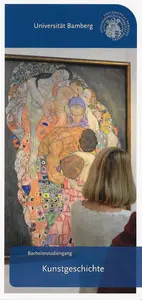Profile and Structure
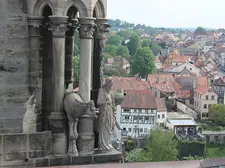
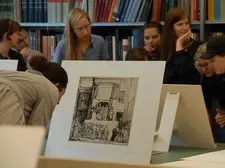
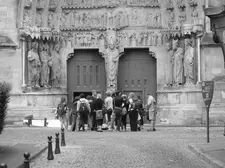

Seeing and understanding art
Do you enjoy visiting museums and churches? Do you regularly go to exhibitions and galleries? Would you like to understand what is depicted in paintings, to be able to identify and date architectural features and to discuss the meaning and function of sculptures?
The Art History programme covers European art from the Early Middle Ages to the present day, as well as the contemporary, international art that has grown out of this. Within the discipline of art history, objects of art from the fields of painting, sculpture and architecture – as well as photography and graphic arts, craftwork, design and new media art– are analysed in their historical and social context.
Studying Art History means placing works of art in various contexts – e.g. historical, cultural, theological, literary or sociological – in order to understand them in terms of form, function and meaning. The multi-faceted nature of this subject makes this one of the most sophisticated and stimulating programmes in the humanities.
Programme objectives
This bachelor’s degree programme leads to a first academic and professionally qualifying degree in Art History. The objective of the degree programme is the acquisition of fundamental, subject-specific skills based in the approaches of cultural studies; in particular, this includes the ability to
- understand and independently apply the methodological principles of art history
- master and use terminology specific to art history and architectural history
- critically analyse and interpret art history sources and specialist literature
- academically analyse and interpret works of art and architectural history from the Middle Ages, the early modern period and the modern era in their various contexts
- suitably present works of art and architectural history, as well as historical art contexts, for a wider audience in speech, writing and media-supported formats.
The total number of 180 ECTS points in the bachelor’s programme results from an intensive course of study in the subject of Art History and a combination of several other subjects. Art History can be studied in the following configurations:
- Core subject with 120 ECTS points
- Major subject with 75 ECTS points
- Minor subject with 45 ECTS points
- Minor subject with 30 ECTS points
Added to this are the bachelor’s thesis, which is written in your first major subject (12 ECTS points), and the General Studies (Studium Generale) component (18 ECTS points).
With Art History as a minor subject (30 or 45 ECTS points), you gain an insight into the discipline’s subject areas, research objects and approaches. With Art History as a major or core subject, you gain an insight into the variety and breadth of discipline-specific topics spanning all time periods. Lectures and seminars go into further detail in individual areas and topics by providing examples, and they therefore create a systematic framework for broad fundamental knowledge. Field trips help you to study objects and buildings first-hand and to engage with their forms and material characteristics.
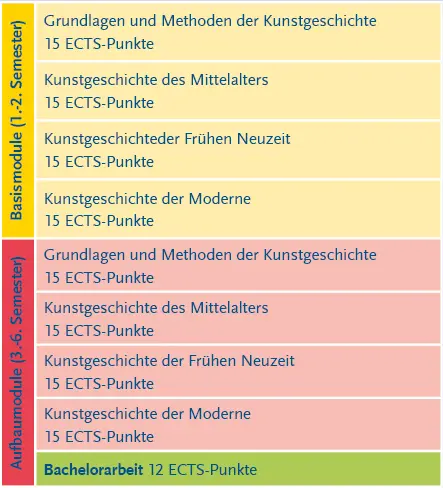
With Art History as a minor subject (30 or 45 ECTS points), you gain an insight into the discipline’s subject areas, research objects and approaches. With Art History as a major or core subject, you gain an insight into the variety and breadth of discipline-specific topics spanning all time periods. Lectures and seminars go into further detail in individual areas and topics by providing examples, and they therefore create a systematic framework for broad fundamental knowledge. Field trips help you to study objects and buildings first-hand and to engage with their forms and material characteristics.
- 120 ECTS points in Art History
- 30 ECTS points in a minor subject of your choice
- 18 ECTS points in the General Studies component (particular classes approved for this component that are interesting for students of all subjects: e.g. language or IT courses)
- 12 ECTS points for the bachelor’s thesis
A minor in Cultural Heritage Preservation, History, European Ethnology, Theological Studiesor Linguistics and Literary Studies completes your bachelor’s studies. Subjects from other faculties such asEducation, Business Administration or Applied Computer Sciencerepresent gateways to further practical fields.
The bachelor's degree programme in Art History is comprised of foundation modules and advanced modules.
Foundation module groups are offered in the following fields:
a) Foundation module group ‘Principles and Methods’ (15 ECTS points)
b) Foundation module group ‘Medieval Art History’ (15 ECTS points)
c) Foundation module group ‘Early Modern Art History’ (15 ECTS points)
d) Foundation module group ‘Modern Art History’ (15 ECTS points)
The aim of the foundation modules is to introduce the respective segment of art history and to apply fundamental approaches and working methods to selected objects.
The foundation module group ‘Principles and Methods’ is composed of:
- two preparatory courses
- the accompanying tutorials
- and six field trip days.
The foundation module groups ‘Medieval Art History’, ‘Early Modern Art History’ and ‘Modern Art History’ are generally composed of:
- one introductory seminar
- one lecture course composed of lectures of a minimum of two teaching hours
- a additional seminar.
Advanced module groups are offered in the following fields:
a) Advanced module group ‘Principles and Methods’ (15 ECTS points)
b) Advanced module group ‘Medieval Art History’ (15 ECTS points)
c) Advanced module group ‘Early Modern Art History’ (15 ECTS points)
d) Advanced module group ‘Modern Art History’ (15 ECTS points)
In order to take the advanced module, it is usually necessary to have successfully completed the corresponding foundation module. The foundation and advanced module groups ‘Principles and Methods’ are an exception to this rule.
The aim of the advanced module groups is to discover further interlinking aspects in the field of Art History and study selected subject areas in depth.
The advanced module group ‘Principles and Methods’ is composed of:
- two iconography seminars
- a two-hour lecture course
- at least six days of field trips.
The advanced module groups ‘Medieval Art History’, ‘Early Modern Art History’ and ‘Modern Art History’ are generally composed of:
- two seminars
- one lecture
What courses do I need to take in the first and second semesters?
Four obligatory foundational courses:
In the winter semester:
- Preparatory course in Visual Arts with the accompanying tutorial (6 ECTS points) – written examination
- ‘Christian Iconography’ seminar (5 ECTS points) – written examination
In the summer semester:
- Preparatory course in Architecture with the accompanying tutorial (6 ECTS points) – written examination
- ‘Secular Iconography’ seminar (5 ECTS credits) – written examination
Insights into medieval, early modern and modern art:
- Two or three lectures (2 ECTS points each)
- Two or three seminars (no advanced seminars [Hauptseminar]!)
- One or two individual days of field trips (0.5 ECTS points each)
Together with the courses in your minor subject and those that you complete in the General Studies component, you should be aiming to complete around 30 ECTS points per semester in order to finish your studies within the standard programme duration of six semesters.
Which courses do I need to take if I study Art History as a major subject (75 ECTS points)?
Four obligatory foundational courses:
In the winter semester:
- Preparatory course in Visual Arts with the accompanying tutorial (6 ECTS points) – written examination
- Introduction to Christian Iconography (5 ECTS points) – written examination
In the summer semester:
- Preparatory course in Architecture with the accompanying tutorial (6 ECTS points) –written examination
- Introduction to Secular Iconography (5 ECTS points) – written examination
Six individual field trips [six days in total, 0.5 ECTS points each, 3 ECTS points in total]
Up to three days of field trips can be replaced by attending a guest lecture on a topic from the field of art history.
One extended field trip [min. six days, 3 ECTS points in total] and a lecture series in ‘Principles and Methods of Art History’ (2 ECTS points)
Two foundation module groups [2 x 15 ECTS points = 30 ECTS points in total]
Please choose two of the three available foundation module groups: ‘Medieval Art History’, ‘Early Modern Art History’ and ‘Modern Art History’. (One period will not be studied.)
In both foundation module groups, you must complete the following three course components:
- a lecture (2 ECTS points)
- a seminar (8 ECTS points); presentation and term paper
- a seminar (5 ECTS points); presentation or term paper or portfolio
An advanced module group [15 ECTS points in total]
The advanced module group must cover one of the two eras that you have chosen for the foundation module groups.
In the advanced module group, you must attend the following three courses:
- a lecture (2 ECTS points)
- a seminar (8 ECTS points); presentation and term paper
- a seminar (5 ECTS points); presentation or term paper or portfolio
>>>Courses offered in the current semester
General Studies (18 ECTS points in total)
Bachelor's thesis (12 ECTS points)
Which courses do I need to complete if I study Art History as a minor subject (45 ECTS points)?
Two obligatory foundational courses::
In the winter semester:
- Preparatory course in Visual Arts with the accompanying tutorial (6 ECTS points) – written examination
In the summer semester:
- Preparatory course in Architecture with the accompanying tutorial (6 ECTS points) – written examination
Six compulsory individual field trips (six days in total, 0.5 ECTS points each, 3 ECTS points in total)
Up to three days of field trips can be replaced by attending a guest lecture on a topic from the field of art history.
Two foundation module groups (2 x 15 ECTS points = 30 ECTS points in total)
Please choose two of the three available foundation module groups: ‘Medieval Art History’, ‘Early Modern Art History’ and ‘Modern Art History’. (One period will not be studied.)
In both foundation module groups, you must complete the following three course components:
- a lecture (2 ECTS points)
- a seminar (8 ECTS points); presentation and term paper
- a seminar (5 ECTS points); presentation or term paper or portfolio
Which courses do I need to complete if I study Art History as a minor subject (30 ECTS points)?
Two obligatory foundational courses:
In the winter semester:
- Preparatory course in Visual Arts with the accompanying tutorial (6 ECTS points) – written examination
In the summer semester:
- Preparatory course in Architecture with the accompanying tutorial (6 ECTS points) – written examination
Six compulsory individual field trips (six days in total, 0.5 ECTS points each)
Up to three days of field trips can be replaced by attending a guest lecture on a topic from the field of art history.
One foundation module group
You may decide yourself whether you choose the ‘Medieval Art History’, ‘Early Modern Art History’ or ‘Modern Art History’ foundation module group.
In one of these foundation module groups, you must complete the following three courses:
- a lecture (2 ECTS points)
- a seminar (8 ECTS points); presentation and term paper
- a seminar (5 ECTS points); presentation or term paper or portfolio
The bachelor’s thesis is an independent piece of written work that shows the student has fundamental or in-depth knowledge of the subject they have studied, and that they are able to apply academic approaches to specific tasks within a fixed time period. The bachelor’s thesis is typically written immediately after the student finishes their fifth semester in that degree programme. Students have three months to complete the bachelor’s thesis. The requirements for admission to the bachelor's thesis are governed by the applicable study and subject examination for the bachelor's degree programme in Art History.
The General Studies component comprises courses specially classified and therefore ‘approved’ for this purpose, which you can put together yourself to achieve the necessary number of ECTS points. This gives you the opportunity to acquire or consolidate transferable, didactic and foreign language skills, as well as skills that are helpful for your future career. An internship that is closely related to your studies can also be applied to the General Studies component with 1 ECTS point for each completed week (maximum 4 ECTS point for one placement).
